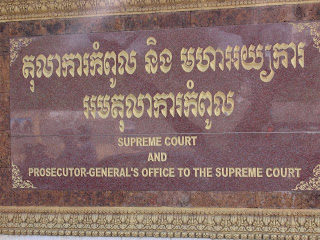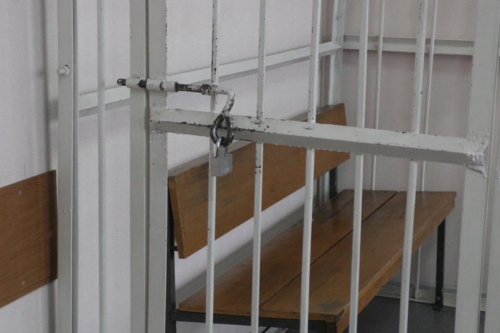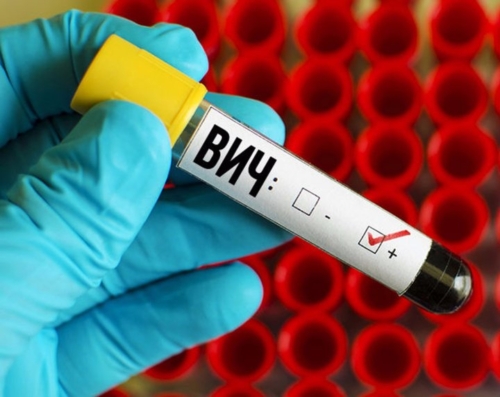
Cambodia's top court upholds 25-year prison term for doctor who infected people with HIV
PHNOM PENH, Oct. 5 (Xinhua) — Cambodia’s Supreme Court has upheld the decision of a lower court to sentence an unlicensed medical practitioner to 25 years in prison for infecting over 200 villagers with HIV via the reuse of unclean needles.
Yem Chrin, 60, was arrested in 2014 in northwestern Battambang province after most of his patients had their blood tested positive for HIV and accused him of transmitting the virus via the reuse of unsterilized needles.
HIV is the virus that causes AIDS.
In December 2015, the Battambang Provincial Court found him guilty of committing “cruel torture” and decided to sentence him to 25 years in prison. The court also ordered him to pay between 500 U.S. dollars and 3,000 U.S. dollars in compensation to each of more than 100 victims, who filed the complaints.
In September 2017, the Appeal Court decided to uphold the Battambang Provincial Court’s ruling against Chrin.
“The Supreme Court sees that the Appeal Court’s decision against YC is correct, so the court decides to uphold the decision,” Supreme Court Judge Nil Non said as he pronounced the verdict on Friday.
YC appeared in court to hear his verdict.
During a hearing last month, YC, who had been a village medical practitioner for almost 20 years, acknowledged his mistake and pleaded the court to reduce his jail sentence to 10 years.
He told the court that he reused syringes on multiple patients because it was difficult to get new ones.
The HIV outbreak in Battambang province’s rural Roka commune, which came to light in 2014, had left some 290 people infected.
Cambodia currently has approximately 70,000 people living with HIV/AIDS and about
Supreme Court hears appeal of physician for transmitting HIV
The Supreme Court on September 20 heard the appeal of a physician convicted of transmitting HIV to 200 Roka villagers in Roka commune in Sangke district, in Battambang province in 2014.
X, who has been sentenced to 25 years in jail by the Battambang provincial court told the Supreme Court: “I had no intention to do it, so please lower my sentence.”
Defence lawyer Sam Chamroeun said the Appeal court had assumed that his client’s mistake had caused some Roka villagers to die of HIV, but the mistake was unintentional [and not premeditated].
He claimed that the Health Department had failed to conduct a thorough investigation which caused his client to receive a heavy sentence.
“The court should lower the sentence since the HIV transmission was caused by a technical error. This problem might not have had occurred if technical officials conducted thorough and regular inspections at each hospital.
“My client would not have been sentenced for years if such inspection had been carried out to prevent this kind of problem from happening,” Chamroeun said.
X was charged by the Battambang provincial court on three counts under Article 18 and 50 of the Law on the Prevention and Control of HIV/AIDS which includes the intentional spreading of HIV to others, committing murder through cruel actions under Article 205 of the Criminal Code, and opening a clinic without legal permission from the Ministry of Health.
Apart from the 25 years jail imposed by the Battambang provincial court, he was also fined five million riel for opening an unlicensed clinic and ordered to pay between two to 12 million riel to each of the 107 victims, including 22 minors, as compensation.
X had then appealed to the Appeal Court. But the sentence was upheld.
Supreme Court Judge Nil Non said the verdict will be handed down on October 4.
In HIV Case, Key Evidence Trails Behind Guilty Verdict
When the Battambang Provincial Court last week handed down a 25-year prison sentence to X, an unlicensed medic blamed for spreading HIV to more than 280 residents of rural Roka commune, it likely failed to consider relevant medical evidence, according to interviews with doctors and health officials.
The court also went forward with the guilty verdict despite not having the results of the genetic testing currently being done at the Institut Pasteur in Phnom Penh, which has the potential to shed light on the origins of the HIV epidemic in Roka and is due to be completed within weeks.
While prosecutors relied heavily on the testimonies of nearly 90 infected villagers during X’s five-day trial in October, the court said on the final day of the trial that it would also seek the results of testing being conducted by the Institut Pasteur, which has been actively studying the HIV that was first detected in Roka in December last year.
It is unclear precisely which tests the court was referring to. According to Institut Pasteur director Didier Fontenille, the testing being conducted by his institute has focused on three separate areas: blood samples from Roka villagers, syringes and rubber tubing seized from X’s house by investigators in December, and the genetic makeup of the HIV in the commune.
While the blood samples were tested shortly after the outbreak was detected in order to confirm the infections, further tests to examine whether HIV and antibodies were present on X’s medical equipment were only completed recently.
Dr. Fontenille said researchers at the institute had not yet completed the “important” genetic sequencing of the HIV in Roka, which would determine the genetic source and possible origins of the virus.
“What we want to know is if there is a high diversity of viruses in Roka or if almost all the viruses are almost the same, which means having an almost unique source,” he said, adding that preliminary results showed little genetic diversity. “We know it is almost one unique source, but what we do not understand yet is if it is only one practitioner, several practitioners or several practitioners plus sexual transmissions and drug use,” Dr. Fontenille said.“We expect to finish the sequencing and analyses in the next weeks, or at least [in] one or two months,” he added.
Dr. Fontenille said he forwarded a report of his team’s findings on X’s medical equipment to the Ministry of Health last month, but that he was unsure if the document ever made its way to the Battambang court.
“The Ministry of Health got the results. I do not know if these results have been presented at the court or not,” Dr. Fontenille said. “We have not been invited to go [to the court].”
He added that the findings—which he declined to disclose—had been sent to his “only contact” at the Health Ministry: Mean Chhi Vun, the former director of the National Center for HIV/AIDS, Dermatology and STD (NCHADS), who retired in February, but remains an adviser at the ministry.
Dr. Fontenille said that Dr. Chhi Vun and others at NCHADS were all appraised of the Institut Pasteur’s findings on the medical equipment, as well as its ongoing effort to sequence the virus’ DNA.
“He knows that very well because we had several meetings,” he said. “We have regular meetings, and the new director of NCHADS also participates in all these meetings.”
However, asked on Monday whether he had passed on the information from the Institut Pasteur to the court, Dr. Chhi Vun refused to provide a clear answer.
“I did not receive the official report from the Institut Pasteur,” he said. “I just received an updated document.”
Asked if he had sent this update on to the Battambang court, Dr. Chhi Vun said he was not sure.“I don’t know,” he said. “You can ask the court.”
Court spokesman Toch Sopheakdey declined to answer questions about whether the court had received the test results.“This is an internal issue of the court,” he said.
Other national and provincial health officials contacted on Monday said they did not know whether the court had received the requested medical evidence.
Ly Penh Sun, who replaced Dr. Chhi Vun as the director of NCHADS, referred questions about the Institut Pasteur’s analyses back to his predecessor.“I do not know about these results that the court requested from Pasteur,” he said.
Voeung Bunreth, director of the Battambang provincial health department, said he had requested the institute’s findings on behalf of the provincial court, but he did not know if they were ever delivered to judicial officials.“I just brought the letter from the court to give to the Institut Pasteur, but I don’t know if the court received the results or not,” he said.
X’s lawyer, Em Savann, said he had not even known that the court requested the institute’s findings in the first place.
“According to what I remember, the presiding judge requested through the provincial health department thatX’s blood be tested,” Mr. Savann said. “But I did not hear the presiding judge request the results of any other testing.”
Trial of Medic in HIV Outbreak Concludes - The Cambodia Daily
BATTAMBANG CITY – The trial of an unlicensed medic accused of infecting more than 270 villagers with HIV concluded Wednesday evening after five days of hearings at the Battambang Provincial Court, with a verdict in the case due in early December.
Authorities say X, 56, is responsible for a mass outbreak of the virus in Sangke district’s Roka commune that was first reported last December. Ten HIV-infected villagers have since died.
The prosecution has argued that X—charged with aggravated murder, intentionally transmitting HIV and operating without a medical license—caused the epidemic by failing to replace his medical equipment between intravenous treatments, using infected syringes on multiple patients.
During closing arguments on Wednesday, deputy prosecutor Heng Luy asked the three judges hearing the case to find X guilty on all counts and sentence him to the maximum term possible—life in prison.
Pointing to the testimonies of nearly 80 HIVinfected villagers, as well as seven health officials and public health experts, who took to the witness stand on the last day of the trial, Mr. Luy said it was clear that X had knowingly infected those he treated.
Over the course of the five-day trial, a stream of Roka residents infected with the virus told the court that they believed X was responsible for their illnesses, as he was the only person to have ever provided them with medical treatment.
Some witnesses, including Loeum Lorm, 52, whose positive test for HIV set off December’s panic, added that they had seen the medic reuse syringes when administering injections to them.
“I suspect X infected the people with the HIV virus because when he used the syringe to inject me, the plastic packaging was open already,” Mr. Lorm said following his testimony last week.
When asked whether X knowingly infected the villagers, as charged by the court, the victims were less sure.
Chi Sor, 45, who was the final villager to give testimony to the court Wednesday, said she was certain the medic was responsible for her infection.
“I was infected with HIV from X because he was the only one to treat me…and I never committed bad acts with another person,” Ms. Sor said by telephone after the trial.
Still, she acknowledged that she had no knowledge of intent by X.
“I don’t know if X knew or not that he was infecting us with the HIV virus,” she said.
In addition to the testimony of the victims, the court called a number of health officials and public health experts to the witness stand. They included Mean Chhi Vun, the former director of the National Center for HIV/AIDS, Dermatology and STD, who retired in February.
Provincial health department director Voeung Bunreth said during his testimony that he believed X was responsible for the outbreak after examining the medic’s home during the initial investigation into the outbreak.
Mr. Bunreth described finding an unsanitary residence with medical equipment strewn about haphazardly and used medicine vials discarded in the backyard.
Contacted Wednesday evening, Roka commune health director By Beng Sor, who also gave testimony to the court, said he had accompanied Mr. Bunreth during the inspection of X’s home and also believed the medic was responsible for the outbreak.
“X didn’t have sanitation —even [on] his bed, he never changed or cleaned his mosquito net,” Mr. Beng Sor said.
The health center chief admitted, though, that this evidence alone was not conclusive.
“Until now, we do not yet have the specific evidence saying that Xn is the source of the HIV infection,” he said.
Mr. Chhi Vun, who is now an adviser to the Health Ministry, deflected questions from the judges regarding the specifics of the Roka case, offering only general information on how HIV could be transmitted.
He said that he was not aware of the results of sequencing testing conducted by the Institut Pasteur in Phnom Penh and the U.S. Centers for Disease Control in Atlanta on samples of the virus from Roka, which could prove that the virus was spread from a single source. Mr. Chhi Vun told the court that experts from the Institut Pasteur were more equipped to answer their questions.
Presiding Judge Yich Chheanavy said the court would attempt to obtain those results from the Institut Pasteur. She said a verdict will be handed down on December 3.
Speaking outside the courtroom before his testimony, Mr. Chhi Vun said it was still too early to say definitively who was responsible for the Roka outbreak.
“Who knows at this point?” he said. “It’s hard to know if this outbreak was caused by this person or that person.”
In his closing argument, Em Sovann, X’s lawyer, said the evidence presented to the court was not sufficient to convict his client on the charges laid against him, requesting that Judge Chheanavy dismiss the aggravated murder charge, explaining that his client never “tortured” Roka’s residents, but rather hoped to help them.
In the trial’s final remarks, X also requested leniency from the judges.
“I treated the people honestly. I did not have any intention to infect them with HIV, so I request the judge reduce my sentence because I need to meet with my children, my wife and my elderly mother,” the defendant told the court. “I need to make money to feed my family.”
Cambodian on Trial for Infecting More Than 100 With HIV
A lawyer says an unlicensed medical practitioner who infected more than 100 villagers in northwestern Cambodia with HIV by reusing unclean needles has appeared in court to face three charges, including murder. Defense lawyer En Sovann says X faces up to life in prison if found guilty….
Murder charge in HIV case
The unlicensed doctor at the centre of the HIV outbreak in Battambang province was yesterday charged with murder, police and court officials said. After questioning that began on Sunday, X confessed to reusing needles on his patients and telling a family member to destroy medical waste before police could seize it, said Chet Vanny, deputy Battambang provincial police chief.
“X confessed to ordering his son-in-law to burn evidence behind his house,” he said. “He also said that he treated patients with negligence and used the same needles to treat them. He’s a doctor without qualifications who has learned [basic] skills at the Cambodian-Thai border.”
X – who faces life in prison if convicted – was also charged with “intentionally” transmitting HIV and running a clinic without permission from the Ministry of Health, said provincial prosecutor Nuon San.
“X was charged with three counts [including] murder . . . I have asked the investigating judge to hold him in pre-trial detention,” he said.
Heng Luy, the investigating judge, could not be reached, but Vanny said X had been sent to the provincial prison. At least 119 cases of HIV have been confirmed in Sangke district since a 74-year-old man tested positive in Roka village in late November.
Update: Some 212 people there are now known to have contracted the virus.
Doctors say the worst hit village in the area’s HIV outbreak appears to be Roka village where 12 percent of villagers tested so far have proven positive – 20 times the national rate. Half of those tested also have hepatitis C. https://www.cambodiadaily.com/news/study-points-to-injections-as-likely-cause-of-hiv-outbreak-75819/
Despite the murder charges, there are no confirmed reports of someone dying.
From the outset, villagers have believed that routine injections from X, administered to at least 30 people, were the source of the infections. In one family, 15 out of a possible 16 have tested positive for HIV.
A search of X’s home last week uncovered used and unused syringes stored indiscriminately. While a relative has said X himself has HIV, Vanny said yesterday that tests had cleared the unlicensed doctor of infection.
“But in the past, he went to Phnom Penh to have his blood tested for AIDS under different names,” he said.
The man accused of destroying evidence, the unlicensed doctor’s son-in-law Chhem Choeun, 32, said yesterday that he often burned medical waste in a hole behind the family’s home.
“I always burn it when it is full. But I forget the last time I did it,” he said.
A source close to the case who asked not to be named said it was not yet possible to determine how many people X may have directly infected, if in fact he was guilty of doing so.
Further tests and investigation would likely determine who had contracted the virus during the first wave of infections. But doubts remain about the possibility of so many people being infected by one doctor’s needles.
Dr Edward Mills, a researcher from the British Columbia Centre for Excellence in HIV/AIDS in Canada, said reusing needles “would almost certainly not lead to this many infections”, referring to the roughly 30 people reported to have been injected.
Needles typically run a low risk of infection, the risk is about one in 10,000,” he said.
As the criminal investigation quickly turned into court proceedings yesterday – at a speed not unfamiliar in Cambodia’s much-criticised justice system – those involved in a parallel “forensic” investigation, led by the Ministry of Health, were stepping up efforts to determine the cause of the infections.
A number of people were being trained to help with that investigation, said Marie-Odile Emond, country director of UNAIDS, which is among the partners working with the ministry. “The [forensic] one is to identify the mode of transmission, how people are infected . . . interviewing a sample of people,” she said. “At this stage, it will be a minimum of a few days, but it could be longer . . . possibly a few weeks.”
Dr Masami Fujita, a medical officer with the World Health Organization, said charges being brought against a suspect did not affect the ministry’s investigation.
“This is a health assessment . . . because we do not know, it could be a combination of things,” he said. “In any case, we have to continue. We need to independently assess [the situation].”
While Fujita said the investigators on his side were communicating with the police, Dr Mean Chhivun, director of the National Centre for HIV/AIDS, Dermatology and STDs, said otherwise.
“We are not talking to the police,” he said. “The investigation is ongoing.”
James McCabe, operations manager at the Phnom Penh-based Child Protection Unit, said court officials would certainly review the ministry’s findings.
“They will consult with the Ministry of Health,” he said.
Yim Sovann, opposition spokesman and lawmaker, said police and the courts had a duty to investigate and charge anyone carelessly spreading HIV.
“But we ask the Ministry of Health to improve the situation [for the future]. The Ministry of Health has to check every private clinic to ensure ethics are upheld, doctors have degrees and everyone has a licence from the ministry,” he said.




